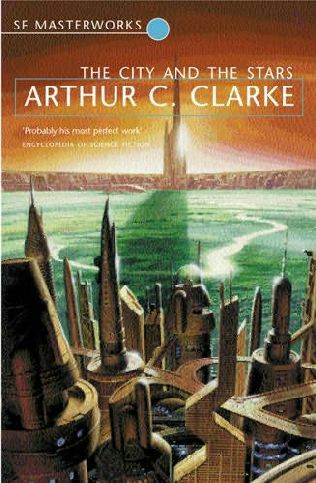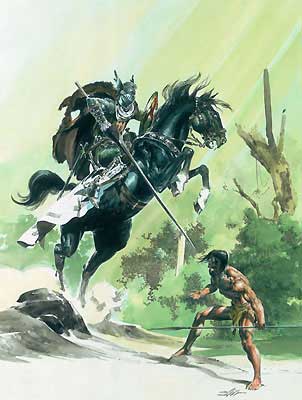One of the things we talked about last class regarding The City and the Stars was the playing off of one another between Diaspar and Lys and the dichotomies that the two represented: “the City” vs. “the Country”, “Nature” vs. “Machine”, “immortality” vs. “death”, “boundedness” vs. “space”… In particular we were talking about the difference in the social structure between the two cities. What it brought to mind for me, and what I couldn’t quite express in class but now with the aid of a computer I can (ta-dah!), were the twin terms of gemeinschaft and gesellschaft, Ferdinand Tönnies‘ sociological categories delineating two types of societies. Gemeinschaft (“community”) is a type of organization in which its members are oriented as much, if not more, towards the larger group rather than their own individual interests, and are regulated by common mores. Gemeinschafts are characterized by
a moderate division of labour, strong personal relationships, strong families, and relatively simple social institutions. In such societies there is seldom a need to enforce social control externally, due to a collective sense of loyalty individuals feel for society.
Gesellschaft (“society”/”civil society”/”association”), on the other hand, is an organizations in which the individual orients themself towards the larger grouping in terms of their own self-interest. Unlike gemeinschaften,
Gesellschaften emphasize secondary relationships rather than familial or community ties, and there is generally less individual loyalty to society. Social cohesion in Gesellschafts typically derives from a more elaborate division of labor.
Tönnies’ classifications are similar in some ways to Émile Durkheim‘s theories on mechanical vs. organic solidarity. Mechanical solidarity, similar to gemeinschaft, emphasizes similarity and collective authority; organic solidarity, similar to gesellschaft, emphasizes difference and individual initiative (The similarities, however, stop there).
Men had built cities before, but never a city such as this. Some had lasted for centuries, some for milleniums, before Time had swept away even their names. Diaspar alone had challenged Eternity, defending itself and all it sheltered against the slow attrition of the ages, the ravages of decay, and the corruption of rust.
Diaspar could be the conventional “City” trope, an ephemeral society whose foundations, both literal and ideological, are based on intangibilities. Matter can be conjured out of thin air, familial ties are affectionate at best, and even the city’s founding legends are (spoiler alert) merely that, legends created to stunt its citizens’ sense of curiosity, exploration and adventure. Like a gesellschaft society, the citizens of Diaspar feel a lessened connection with each other. Hilvar’s musings on the city reflect his general feelings of loneliness among a sea of people:
Within a few days of arriving in Diaspar, Hilvar had met more people than in his entire life. Met them – and had grown to know none. Because they were so crowded together, the inhabitants of the city maintained a reserve that was hard to penetrate.
Lys, on the other hand, couldn’t be more different. As opposed to the millions of Diaspar, the small village of Airlee is composed of less than a thousand. They have shunned the possibility of immortality and retain the cycles of birth and death as well as the range of ages in between, exposing Alvin to states of the human condition (childhood, old age) that he had previously been unfamiliar with. The also rely less on technology and as a consequence, retain a skill that the citizens of Diaspar now only have when dealing with machines: the ability to communicate telepathically. The citizens of Lys, like people in a gemeinschaft society, are thus more collectively integrated.
The “Country” trope that Lys seems to suggest brings up something that Hung-Te touched on in class: though Tönnies doesn’t seem to be making a value judgement between the two types of organization, Clarke seems to be. As a brief end note: did anyone else get the Rousseaunian noble savage vibe? Rousseau’s theory of Natural Man suggests that we were better off before society made us “civilized”: we were stronger, faster, could see without the aid of glasses, etc. The juxtaposition between Diaspar and Lys can’t help but make the reader think that the latter comes out on top: they’re more intelligent, more self-reliant, and let’s not forget: they can read minds. Any ideas on what Clarke’s vision of the future could suggest in that respect?

